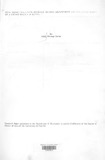| dc.contributor.author | Ndii, David Mwangi | |
| dc.date.accessioned | 2013-05-29T07:57:36Z | |
| dc.date.available | 2013-05-29T07:57:36Z | |
| dc.date.issued | 1978 | |
| dc.identifier.citation | Master of Arts of the University of Nairobi, 1978 | en |
| dc.identifier.uri | http://erepository.uonbi.ac.ke:8080/xmlui/handle/123456789/26831 | |
| dc.description.abstract | The domestic credit component of the money supply is an important tool of monetrary and fiscal policies in Kenya. Empirical studies in Kenya have centered largely on the well defined relationship
between money supply and the balance of payments.
This study is an attempt to investigate the less explicit, albeit equally important relationship between
money supply and the real side of the economy i.e domestic output. Of particular interest is to
establish the dominant transmission mechanism of the effect of real money balances on domestic
output.
The study uses annual k'enyan data from 1968 to 1988 to estimate sectoral output equations deriving
from a monetary model of the Kenyan economy.
On the basis of our results, we find a predominantly supply side transmission mechanism- where
money.balances' major effects are on current production decisions.
The major conclusion is that the conduct of monetary policy to stabilize the balance of payments
must take into account the output implications of changes in domestic credit. . | en |
| dc.language.iso | en | en |
| dc.publisher | University of Nairobi | en |
| dc.title | Real money balances, domestic output adjustment and implications of a credit policy in Kenya | en |
| dc.type | Thesis | en |
| local.publisher | Department of Economics, University of Nairobi | en |

